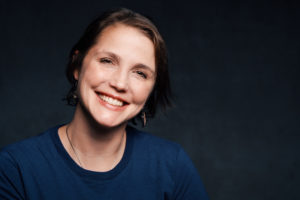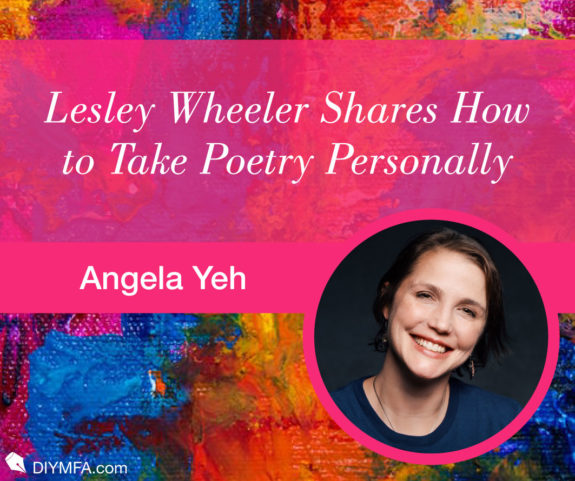Hello, my lovely poets and poem-tinkerers, my fellow word wanderers. This week, I am coming to you with a special guest, Lesley Wheeler, author of the brilliant and warm nonfiction work of art, Poetry’s Possible Worlds. I had the pleasure and good fortune to interview her, and I can’t wait to share the insights and gems poetry reading and writing can hold for us all.
About Lesley Wheeler
Lesley Wheeler’s latest book and debut work of nonfiction, Poetry’s Possible Worlds, was published in May 2022 by Tinderbox Editions. A hybrid of memoir and criticism informed by the cognitive science of “literary transportation”–getting lost in a book–it reads 21st-century poetry with academic depth and personal significance. Wheeler is also the Poetry Editor of Shenandoah and the Henry S. Fox Professor of English at W&L University. Her poetry reviews have appeared in the Harvard Review, Kenyon Review, Strange Horizons, and many other journals.
Interview with Lesley Wheeler
Angela Yeh: You have a full-time job, a family, and are the poetry editor of the Shenandoah. How did you ever find the time to write Poetry’s Possible Worlds?
Lesley Wheeler: I am not capable of writing in long forms at all during the school year. I need some concentrated time to do that. I can write poems in fragments in an hour here and there. You can take an hour to get the bones of a poem down and another hour to revise what looks like a poem. I don’t think nonfiction works that way.
AY: Right. I think about poetry as the Instagram of the literary world. Longer fiction takes time and space to focus on. I liked what you wrote about poetry as a whole world that people don’t often associate with poetry. Can you tell us a little about that?
LW: Poetry has world-building qualities. It’s trying to build little universes that transport readers. I think people have underestimated the extent to which that is true: that poetry has the power to conjure another world fast.
AY: I love the concept of poetry writing as building little universes, and I feel the same. I’ve gotten just as lost in a poem as I have a longer-length work of fiction. Have you had any push-back to the idea that poetry can transport you as much or more than novels, for example?
LW: I may at some point, but haven’t yet! I often feel that when I’m absorbed into any work of literature, when my attention is controlled, I’m stepping over a threshold into an alternate universe. For that reason, I think all literature has a kinship with fantasy fiction. Poetry and fantasy are more related than they are different, although some literary worlds seem more familiar than others. Genre is a continuum more than a set of cleanly separate categories.
AY: There is a lot to unpack there. I love this idea of literary transportation you write about – I have experienced this many times in my life, both when I read and when I write but can you tell us a little more about what you think is going on when this happens? How do you think reading and writing create change in people?
LW: There are simple ways literature changes us that people don’t often think of; reading, for instance, changes your memories. The brain doesn’t always distinguish between what you’ve experienced and what you’ve read. Reading can add to our store of experiences that we identify with.
Also, experiencing literature or entering what is sometimes called flow physically changes us – it can change our pulse and respiration. I find it to be a profoundly soothing experience when I am transported. It’s a lot like prayer and meditation. And, of course, literature can occasionally change people’s minds and influence their politics. I have a colleague, for instance, a cognitive scientist named Dan Johnson, who has researched people’s prejudices before and after reading a tale of an Arab American woman’s experience. He finds alterations in people’s prejudices immediately after reading.
This is great, and one hopes that is true, but the research on that is still unfolding.
AY: Right, we don’t yet know how long those alterations last.
LW: Right. I don’t think it’s 100% clear yet. Does it change your potential sympathy for a real woman in the world, or does it only operate in the abstract? I think it’s very hard to determine to what extent reading makes us better people, although we want that to be true. All of us readers feel good about what we do. But it also could be true, as Suzanne Keen suggests in her book Empathy and the Novel, that I spend less time in activism because I spend more time reading and writing literature.
One famous example of literature’s real power in the world was Harriet Beecher Stowe’s novel Uncle Tom’s Cabin. In the 19th century, it influenced abolitionist arguments and eventually affected legislation. I just don’t think it happens very often.
AY: Right. I just read ‘The Moon is Down’ (title inserted post interview) by John Steinbeck. Someone had recommended it to me after our conversation about the war in Ukraine as an example of literature affecting the war. But it shows that we can only think of two or three right now.
LW: Yes, exactly.
AY: Changing track here for a minute, you write that there are risks to reading personally as a critical practice – what does this mean to you? What am I risking when I read personally as a critical practice?
LW: I worried, as I was writing, that I was centering myself as opposed to centering the poems. I worried especially about that as a white writer. Being a critic and writing about my love of poetry is service to poetry. It is bringing new work to other people’s attention. But writing a memoir about reading other people’s poetry is tricky. Striking that balance in each chapter–between meditation on the poem and unfolding how the poem intersected with my own life—was hard., Poetry’s Possible Worlds took ten years to write, and that’s partly why. It was really important to me not to write a narcissistic book, as if these poems are only important because they influenced me personally.
Certainly, the poems are worth reading in their own right.
AY: The poetry was lovely. I would read them a few times and then read your analysis with anticipation. I loved reading your book – critical theory intertwined with the unfolding of your life from the death of your father and what that meant, finally to the death of your mother and how those experiences affected your interaction with the poetry.
We have a lot of beginner writers concerned about the balance of writing about uncomfortable subjects, between the need to write about trauma and the fear of ‘rocking the boat’ with family members or, what if my mom reads this, you know? I feel like you did this very well. How did you thread that needle for yourself, and what was that like?
LW: How I’ve threaded the needle for myself has changed over the years. I used to write much more frankly about my children, and I now realize it’s completely fair for them to object to that sometimes. One of my revisions to this book was that I took out many references to the specifics of their lives. I was fairly frank about assault and harassment because I’m not interested in protecting the feelings of people who treat others so badly.
I’ve thought a lot about how my mom read all my books, and some part of me knew that she would not be reading this one. Her death was terrible, but it also enables me to be more frank about my childhood. My father was abusive, and I did not feel defended enough by my mother. That would have been very hard to talk to her about. Even though I miss her very much, there is paradoxical freedom in not worrying about her responses to my writing.
The most important thing is to ground your stories in your own experience, minimize your speculation into other people’s motives and experiences, focusing instead on what the experience meant for you. What a therapist would call making ‘I’ statements, rather than “you did this to me.”
AY: Right, that is fantastic advice, thank you. Being brave and open about our experiences improves our writing, and the reader is better off too. I will take that advice for myself, thank you. So, to wrap up, what would your advice be for anyone looking to get into writing and reading poetry today?
LW: The advice is the same that many people give: read a lot. Find what you love, and study how it’s put together. Something I did a lot at the beginning was focus on contemporary authors’ first poetry collections. I would also look at the acknowledgments page to see where they had published, so I could go to those magazines and see if I could submit there, too. The acknowledgments page is a pretty valuable guide to the literary ecosystem. My second piece of advice is to treat writing and publishing as a research project. Learning the skills and craft takes a long time, but you must also research how the publishing world works. Finally, if you’re not going the MFA route, as I didn’t, I think the smaller weeklong or weekend workshops are tremendously helpful.
AY: Ah, yes, the acknowledgments page! Brilliant. I know you’re busy, so thank you for speaking with me today and sharing your insights about poetry.
You can find out more about Lesley on her website or follow her on Twitter or Instagram! Be sure to check out Poetry’s Possible Worlds for yourself.

Angela Yeh is an East Coast Canadian native that lives and works in the great state of Texas. Angela is a black belt wanna-be who loves to garden, write about magic, and eat cake. If you’d like to check out her first published novel, A Phoenix Rises, she will send you cookies. She lives with her husband, two lovely human children, and three cranky fur babies. You can follow her on Twitter and Instagram or on her website.







